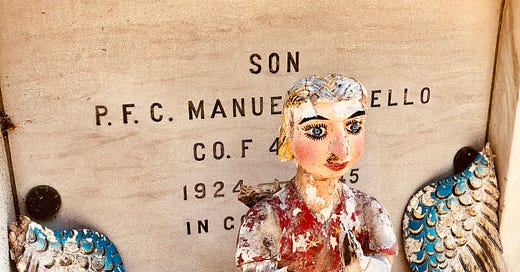The story below is my submission to the STSC Symposium, a monthly set-theme collaboration between STSC writers. The topic today is “Perspective”. Just like you cannot step into the same river twice, you also cannot experience the river unless you step into it. This essay is part of my attempt to better understand us humans.
When life expires and we, who are left behind, witness it — something happens to the fabric of reality. The moment when life, as we know it, pricks a hole in an invisible membrane and we linger in something else for a period of time.
Perhaps you have witnessed death and know exactly what I mean. Perhaps you will one day witness it, and see that it is different from everything else you will ever witness in your entire life. Different from what they told you it would be. Longer or shorter than they told you it would be. Sudden or expected and always different than they told you it would be. That is death.
You can, of course, only observe it from the outside. You don’t have access to the mystery itself. Yes, you will, for a moment, be suspended in that opened dot in the fabric of time where death hangs, but you will not be with it. You can only perceive it with your human senses.
For a moment, and not longer, hangs the great mystery in the air and yet none of us living will ever be able to grab it so we can look closer. So we can understand. It is the same moment that happens now, somewhere in your town and country, and a hundred years ago, and two thousand years ago and five thousand years ago.
The finite moment that left the living witness unable to fully grasp what they just experienced. When life left the living body it just inhabited a moment ago. When that which lived inside the body clearly and without a doubt no longer is present.
Some time ago I came across “The Soul After Death” written by Seraphim Rose, an Orthodox monk who died in 1982.
“The Soul After Death” is an attempt to compare near death experiences outside and inside the realm of Christianity, and specifically the Orthodox branch. Whether the reader is religious or not, it’s a worthwhile read that opens the door or perhaps more correctly, allows you to look through the glass darkly. Because it is after all a mystery to both scientists and the religious. But both have ideas about what occurs.
Seraphim Rose explains the Orthodox theory of what the soul will go through after death, and it is definitely a sobering perspective. For example, according to the Orthodox belief the soul has to go through a series of trials before it can proceed through to heaven (or a pre-location of heaven.
Demons will tempt the soul at various toll houses. Each toll house is supposedly devoted to a specific type of sin. This sounds terrifying of course, and Seraphim Rose reminds the reader of the importance of asking for the forgiveness of sins and repentance throughout life.
Unsettling, fascinating, and perhaps worth reading if you’re into near-death theories. Worth mentioning: many Orthodox experts question this opinion and I recommend the reader takes time to skim through the abundant content (scientific and religious) online for a more balanced view.
When I attended a funeral recently, I came to think of this quote:
“There is no culture without a tomb and no tomb without culture; in the end the tomb is the first and only cultural symbol.”
It is from René Girard’s “Things Hidden since the Foundation of the World.”
In recent years I have been reading René Girard’s theories about what it means to be human and how we function within groups. A logical puzzle piece is, then, to gain an understanding of how we humans perceive death.
Girard’s “Things Hidden since the Foundation of the World” should be tackled with patience, a highlighter and pencil! Read it while caffeinated. It’s dense, it’s a forest, and it will change your life. You will wade through chapters so dense you barely know what’s going on, until you suddenly see a paragraph that blows your mind. But the reward for reading this book is an increased understanding of what it means to be human. Few days pass without me reflecting on Girard’s ideas. He helped me grasp a strand of grass in the vast wheat field that is the mystery of life.
“Wanting” by Luke Burgis (follow his Substack) is a wonderful, and much more accessible, introduction to Girard’s mimetic theory. Read it if you’re curious about how and why we humans want things. Heck, read it if you’re human!
In connection with the Catholic funeral traditions it is not uncommon to have an open casket wake and funeral. The funeral I attended was open casket. Since I have recently read about death I reflected a lot on this part of the remembrance ritual.
Growing up in Finland I cannot remember a single open casket funeral or wake. The Lutheran faith in Finland has something called “utsjungning” (to sing out, to sing farewell) that happens instead of a wake. The casket is closed. As I understand it hymns are sung and a priest might be present to say prayers. And there is of course coffee and such, but never alcohol (unless things have changed since I lived there).
The wake I attended was an opportunity for friends and family to say farewell to the actual dead person. As I walked into the funeral home parlor the first thing I saw were small groups gathered here and there, quietly speaking. And children. Children moving about and being there, in the midst of the almost palpable grief. And in the front, in the open casket, the person who had died, surrounded by flower wreaths in solemn lighting.
A thing struck me as I watched people show their respect for the deceased. They all somehow knew how to do it.
Now and then someone would separate from the groups and walk up to the casket to say farewell. They would kneel down and make the sign of the cross, and then silently share something with the deceased or say a prayer. This happened again and again, and once the person had returned back to the mingling groups, regular conversation resumed. Family members were gathered and were grateful for the support and love that everyone brought.
Seeing a dead person in a casket stops time. There is only now. This person you spoke with and laughed with — it looks a bit like that person. And yet, it clearly isn’t that person any longer. I don’t have many deep thoughts about whether open or closed caskets are “better” — but in this instance it seemed appropriate and I believe it aided the grieving process.
Laughter would be heard now and then, as would sounds of crying and deep sighs. Stories about the person who had died were shared and everyone had some fun and moving anecdotes to share. Downstairs in a small cafeteria alcove were refreshments so guests could take breaks and remain there as long as they wanted.
Then, the following day, the actual funeral ceremony was held by a priest and even if it was much more solemn, a few moments of smiles and laughter fit in when some humorous remarks were made. This was now the moment to say farewell to this human in this world. Of course we will continue to remember him. But this was the last chance to actually see this person ever again.
It was as if we, in our grieving group, had been on a two-day journey together. A journey only understood by us. And now it was coming to an end. A sense of finality hung over the space. Our meeting with death was coming to a conclusion.
This was absolutely beautiful. Can one say that? What I’m trying to say is that I observed humans interact with death in a way that strengthened the humans. It was meaningful to them to come and say farewell to the departed. It brought a sense of support and love to the family.
It helped us humans see and experience that which no technology yet can undo: death. It was beautiful and I was grateful to be able to take part in the exhausting journey of saying farewell to a fellow human.
Very few people wish to speak about death because it makes them uncomfortable. That is why I wrote this. To prick a little hole for us. You know what they say, right? We’ll all have to face it one day anyway.
by Karin Boye
Here I go not. This is not I.
This is a lying reflection alone,
asking, wondering where I have gone,
yearning one day to meet its reality.
The legend tells: far in a distant land
flows a mirroring flood from invisible source.
Thousands of beings, blessed, holy souls,
lean like lilies o'er the banks of sand.
Light without limit envelops their eye,
air trembles, sated by a beauty without like.
In this realm perfect spirits walk,
There stands in eternal light my true I.
The reflection is gone from the glittering surge.
It was once torn away by the angry stream,
wanders around, unreal as in a dream,
unfinished, broken, of itself in search,
Do I not hear the flood's waves far away?
Deep from my inmost depths its water flows.
There, where life's swell into day breaks and goes,
it waits for me concealed, my god-begotten I.
—
by Wisława Szymborska
Out of every hundred people
those who always know better:
fifty-two.
Unsure of every step:
almost all the rest.
Ready to help,
if it doesn't take long:
forty-nine.
Always good,
because they cannot be otherwise:
four—well, maybe five.
Able to admire without envy:
eighteen.
Led to error
by youth (which passes):
sixty, plus or minus.
Those not to be messed with:
forty and four.
Living in constant fear
of someone or something:
seventy-seven.
Capable of happiness:
twenty-some-odd at most.
Harmless alone,
turning savage in crowds:
more than half, for sure.
Cruel
when forced by circumstances:
it's better not to know,
not even approximately.
Wise in hindsight:
not many more
than wise in foresight.
Getting nothing out of life except things:
thirty
(though I would like to be wrong).
Doubled over in pain
and without a flashlight in the dark:
eighty-three, sooner or later.
Those who are just:
quite a few at thirty-five.
But if it takes effort to understand:
three.
Worthy of empathy:
ninety-nine.
Mortal:
one hundred out of one hundred—
a figure that has never varied yet.
Thanks for being here! What can you do to support me? Well, since you asked, you can buy No End Code, my sci-fi anthology. You can also subscribe to this newsletter and spread the word. Oh, and press the heart button and leave a comment!
All photos by yours truly.









As sad as death is, the reminder that we are all human and will not live forever encourages one to fully live or have an existential crisis. It's also an opportunity to truly connect as a family as so many people live pretty disconnected lives from their families today. Those who choose not to participate because it's too upsetting or will disrupt their lives are missing out on renewing the ties that bind us together and the sense of renewal you feel after confronting what is really important in life and that is our relationships to one another. Lots of food for thought! Thank you!
Beautifully written, and chimes with my wonder and dismay at the thought of the act of killing another human being. How can anyone deliberately extinguish another life force? I haven't expressed myself well, but hopefully you know what I mean